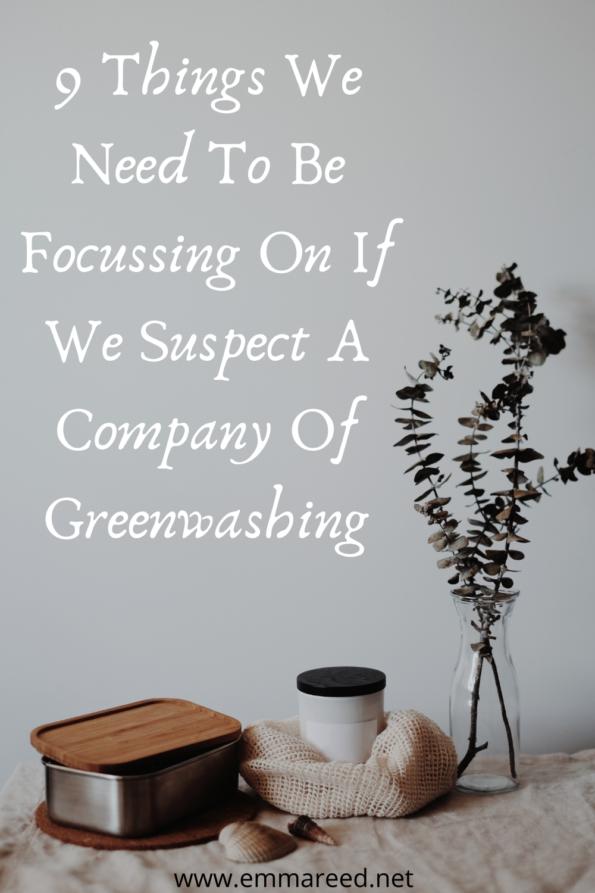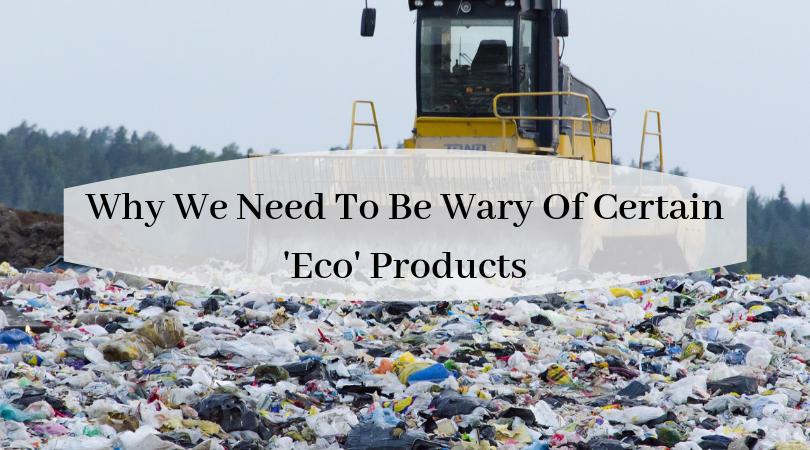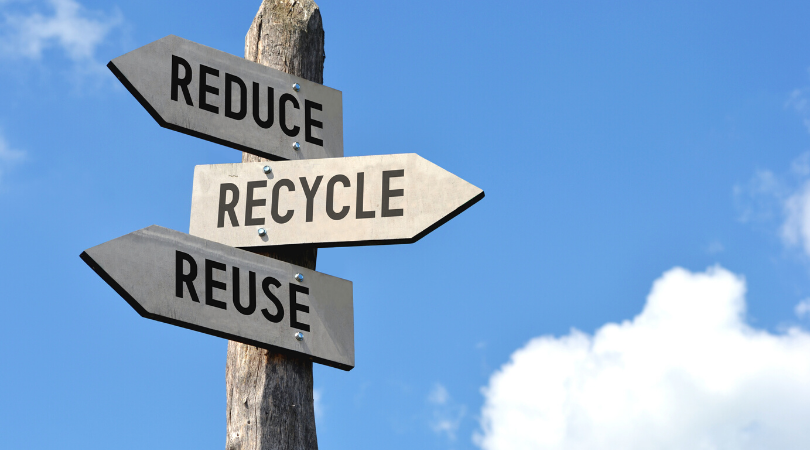
9 Things We Need To Be Focussing On If We Suspect A Company Of Greenwashing

Greenwashing, this is my biggest bugbear right now. I have written about this before here but if you aren’t familiar with the term here is the definition:
What Is Greenwashing?
“Greenwashing is when a company or organization spends more time and money on marketing themselves as environmentally friendly than on minimizing their environmental impact. It is a deceitful advertising gimmick intended to mislead consumers who prefer to buy goods and services from environmentally conscious brands“
Yes, it is great that more eco-conscious people are trying to bring better products to market but how many of them are throwing around these “eco buzz words” and misleading their customers? In the last year, in my opinion, the answer is many. Yes, ok I am now an initial sceptic of any new eco company but can you blame me after some of the conversations I’ve tried to have with some, only to get a copy and past reply each time? When a company is throwing facts and figures at you instead of directly answering your questions? OR (and this is the worst) the ones who never reply or who even delete your comment?! That most definitely screams greenwashing is afoot. But how can a normal consumer tell that a company isn’t all it is claiming to be? Usually, at first glance, they can’t. In fact, most people are drawn in by a new brand with a fancy green logo, with these buzz words of “biodegradable, compostable, eco-friendly, sustainable” because it makes them feel as though they are about to do the right thing and why wouldn’t they think they are? This company is promising so much, it is so easy to just jump straight in and buy it and I don’t blame anybody for doing so, I’ve done the exact same thing before but what the last 2 years of research, watching documentaries and reading articles has taught me is that living more eco-friendly isn’t as simple as black and white and that there are many ways in which a company can get around this and basically bulls*it their way into your homes. So, here are 9 things you need to be focussing on if you suspect a company of greenwashing and tips on what you should be asking them…
Biodegradeable
This seems to be the word of the year doesn’t it? Our product is great, it’s the best, it is biodegradeable. Ok, let’s ask this:
- Will it biodegrade in the time you are stating if it is in landfill?
And this is the most important question because I can tell you now the answer is… NO! And do you want to know why? Because landfill does not provide the right conditions in which a product can naturally biodegrade. Their tests would have been conducted under lab conditions and that is all they need to be able to say it biodegrades; because it does with the correct amount of oxygen, moisture, warmth and light. But landfill doesn’t provide that, does it? It gives you plastic bin bags, piled on top of thousands of other plastic bin bags. The rubbish is suffocated under mountains of more rubbish and is laying next to items that won’t give that product a helping hand in degrading. If you can biodegrade it in the ideal way that’s great, but let’s face it, no one is doing that at home and no, it isn’t the same as composting (see below in a moment). There is one other thing that I need to highlight too. You MUST check how your waste is disposed of because if it is all incinerated having a biodegradable product means nothing so I wouldn’t bother wasting your money on a more expensive item that is just going to be burned along with the product that is cheaper and non-biodegradable. I may be an eco-blogger but I would never sell someone an eco-product that has a zero end game for the environment.
Compostable
Composting is almost an art form. Before I even bought my home compost bin, I bought a book to learn about this process and I studied it for quite a while (I even wrote a blog post on that here).
“Compost is organic matter that has been decomposed in a process called composting. This process recycles various organic materials otherwise regarded as waste products and produces a soil conditioner”
There is a method, there are items that work well in a compost bin and others that should never be added. You can quite easily slip up and overdo it by adding too many green foods and end up with a sloppy, stinky mess or you can use too many dry items and never see a change. It needs balance and it can take practise in getting this right. After all, you are trying to create nutrient-rich compost for your garden and you certainly don’t want any old product going in there! So, if a product IS claiming to be compostable what do you need to ask for?
- Can you show me the process? Maybe in a video?
- Have you had tests conducted on what is left over?
- Is it 100% plastic-free, can you assure me that no microplastics will be present?
And if it is a baby wipe or a disposable nappy brand claiming this, your biggest question has to be:
- Are you informing your customers that human faeces cannot be composted?
Because that is a VERY important piece of information that should be given to every consumer. Human faeces will contaminate the compost, they can harbour and spread viruses and these can also seep into the ground and waterways. You do not want your child’s poo on wipes and nappies in there.

Recyclable
Everybody loves a product that can be recycled. It means that you can purchase it, use/eat the contents and feel good that the packaging can go into your recycle bin and go on to have a new lease of life. Recycling is a positive in a lot of ways but it still uses energy which means it isn’t as green as you may be imagining and in the case of plastics, it isn’t limitless. Most plastics can only be recycled 3 times because it gradually breaks down with each process. However, having said this, it is one the best ways we have right now to tackle a big part of our waste problem so it is really important that companies continue to produce packaging that can be widely recycled.
The biggest problem to us as consumers is that a lot of our kerbside collections don’t take all of the plastics known to man. Some are too complex and need to go off to different plants and this means more work for us. You may have already heard of Terracycle?
“TerraCycle is Eliminating the Idea of Waste® by recycling the “non-recyclable.” Whether it’s coffee capsules from your home, pens from a school, or plastic gloves from a manufacturing facility, TerraCycle can collect and recycle almost any form of waste. We partner with individual collectors such as yourself, as well as major consumer product companies, retailers, manufacturers, municipalities, and small businesses across 20 different countries. With your help, we are able to divert millions of pounds of waste from landfills and incinerators each month“
Terracyle is a great way of sending more of your packets and so on, to be recycled BUT you do have to find somebody local to drop these off to. This also means that you will have to have the space in your home to store up those packets until you have enough for a drop. It is perfect if you do have someone nearby and if you get into a good routine of collecting and sending.
Other options available to us are supermarket drop off points as most of these now take plastic bags, bread bags, batteries, brita water filters etc. Again, you would need to be organised enough to do this.
So, the question you need to ask is:
- Can I recycle your product kerbside?
If it can be, that’s perfect for you. It makes life far easier and I am pretty sure that the majority of people would do this. However, if it isn’t for kerbside and if you are not willing to take the time to find out who your local Terracycle drop off is or to take it to a dedicated drop off at your local supermarket, it is just going to end up in the normal bin. Saying it is recyclable is one thing, telling you HOW it is to be recycled is the part that a lot of companies miss out and yet this is the part you as the consumer needs to know.
We Are Sustainable
Are you? How? Basically, that is it. You need to hear and see evidence of this because it is a word that seems to be placed on many logos with no further details. What does this mean exactly? And if it means you have reduced your plastic, that you pollute less, that your carbon emissions are lower or will be lower in x number of years, I am sorry to say that does not mean you are sustainable. Oh and if anybody ever claims to be 100% sustainable, that is bulls*it at it’s finest. The definition of sustainable is:
Sustainable is an adjective for something that is able to be sustained, i.e, something that is “bearable” and “capable of being continued at a certain level”
Ecological Sustainability means:
“We conserve the productivity of the waters, the soil and the ecosystem, and reduce our impact on the natural environment and people’s health to a level that the natural environment and humanity can handle”
Anything that takes and takes, that does not give back, that leaves a carbon footprint plus has waste at the end is NOT sustainable. The eco-system is sustainable, it sustains life and continues to give, take and give again (the circle of life basically). An apple tree is sustainable. It grows and apple, you eat it, that core decomposes into the ground and the seeds can produce another tree, and that first tree will still go on and give you more apples. For a company to say it is sustainable you would need to see that what they are taking from, they are giving back. Do not be afraid to challenge anybody on this because the reason we are in such a state with our Earth is because we have all taken too much in the first place, if we want to live sustainably we have to have balance.

Sustainably/Ethically Sourced
This is something that we all love to see, that what we have bought has been sustainably/ethically sourced but (yes, there’s a but again, sorry) what does this mean? Unfortunately, it can mean that a company has just ticked one box from a HUGE variety of aspects and this isn’t something that can yet be clamped down upon. Ideally, you would want the products to come from sustainable materials, for example, wood from a forest where for each tree that is cut down, another is planted. You would also expect the workers to be paid and treated appropriately. You would expect the factories to not be polluting waterways etc. And that carbon emissions are being reduced. Alas, you cannot guarantee any of this and fast fashion companies are the worst culprits. What you want to be asking is:
- Can you tell me where your materials are sourced and how you ensure sustainability takes place
- Can you tell me where your factory is? (Anyone avoiding this question should be a clear indicator that things aren’t quite right)
- Do you visit the factory and check the conditions the staff are working in?
- Do you pay the factory workers fairly?
- Do you give them work benefits?
- Do you have a video of your factories that I can see?
- Do you offset your carbon emissions?
As they answer these, more questions may come to mind but you are perfectly within your right to ask away.
Vegan
Vegan has become a well-used word just lately and I have seen it being applied to a lot of products. For a product to be vegan it must be cruelty-free (no testing on animals), it must not contain animals by-products and it must not take from an animal/insect (honey for example). Being vegan isn’t just about having a specific diet, it is about a lifestyle and it shouldn’t be a term that is thrown about here and there. If you are unsure if a company is being honest enough just ask:
- Where are your products made?
- Can you assure me that no animals were tested on? Can you prove this?
- Is there a list of the full ingredients used?
- Can you assure me that there is no chance of cross contamination in factories from other products that may not be vegan?
- What makes your product vegan?
Tree Planting
Again, it’s another amazing thing that a customer wants to hear;
“We will plant a tree for every sale over x amount”
But how do we know that is true? Ask them:
- Can you give me a link to the company that you are partnered with on this?
Then you can do your own research and make sure that this company is registered and does in fact have a partnership and that their profits do go into this scheme.
Our Mission Statement
This is a section on a website that companies use to state what they do, what they want to achieve, how they are going to achieve this and it gives us a little insight into who we are buying from. This is fantastic for people like me who need to know that I am lining the pockets of the right people. In here I would expect there to be plenty of facts and figures, a back story, a reason for doing what they do and how they are planning on giving back. If you feel this is a bit wishy-washy, that it seems to have been written to just look good and so on, then why not ask them a little more?
- HOW are you planning on achieving x, y, z?
- WHEN do you predict you will be able to offset your carbon emissions?
- WHERE is your factory that uses 100% green energy?
- WILL you show us a copy of your donations to x charity?
- CAN you prove that this is happening?
- WILL you show me the charity, environmental certifications?
It is very easy to sit behind a computer and say oh we are going to do all of this and save the world but it is quite another to break it all down and be up front and honest with their customers.

Made In The UK
And? Does that immediately get you the eco card? Nope, not at all and do not assume that this makes them more green than a product coming from China (and vice versa, China doesn’t have to mean environmentally bad). Ok yeah they won’t clock up the miles that a product made overseas will which is better from a carbon footprint point of view but it does not give any indication on how materials are sourced, whether plastics are used, what pollution comes from factories or how eco-friendly the packaging is. You will need to determine all of this yourself and not jump to conclusions that made in the UK means eco. Ask them:
- Where do you source your products/materials?
- Who makes them?
- Where are your factories?
- How are these powered?
- What measures are you taking to ensure you are being as green as possible?
What Else Can You Do?
If you ever want to dig a little deeper into the ethics of a company there is a fantastic app called Good On You which will give you a full breakdown of how that company scores on many aspects such as whether they pay their workers well. You can also ask a company you are suspicious of for a sustainability report (if they have one), check for awards or affiliations with reputable and recognisable companies (for example PETA or WWF) and always, always read reviews.
Have you ever come across Greenwashing? Do you think more needs to be done about it?

Pin for later:





